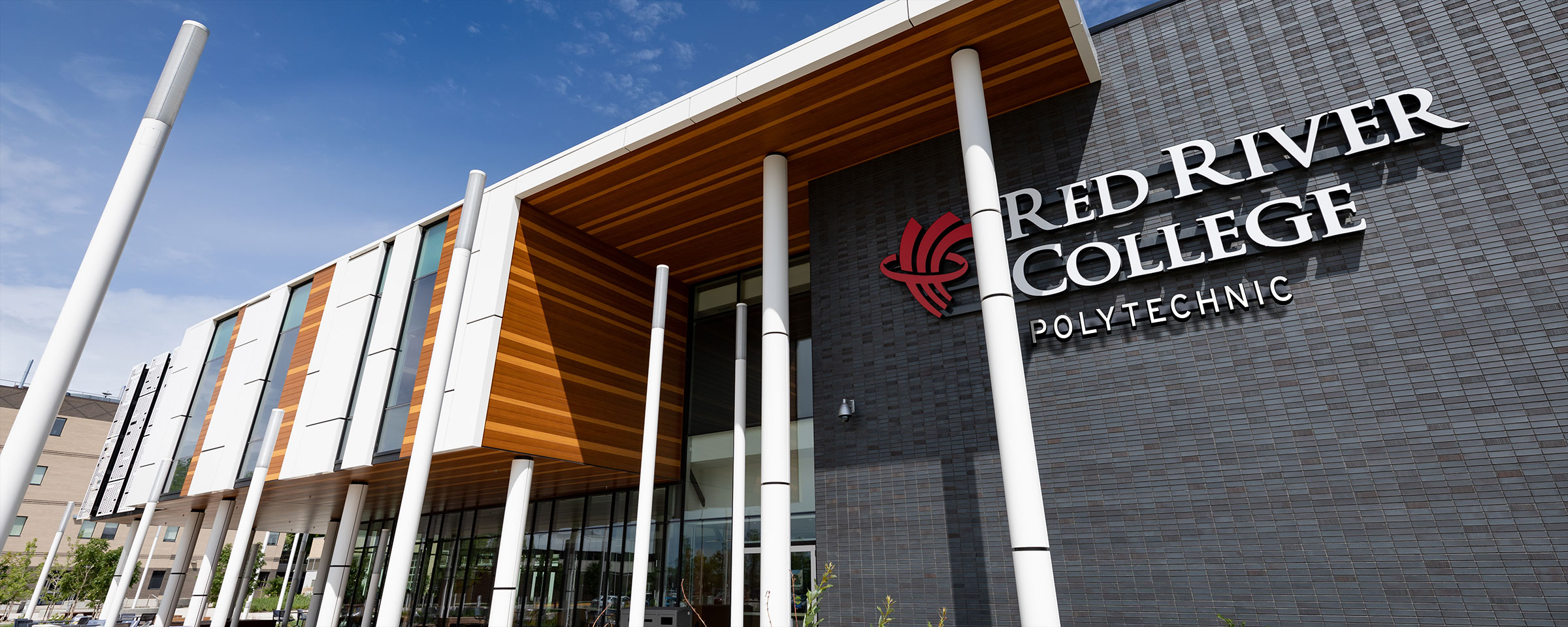RRC Polytech hosts 23rd Annual Pow Wow recognizing Indigenous graduates’ achievements; coincides with Day of Awareness for MMIWG2S
The following message was sent on behalf of Fred Meier, RRC President and CEO to All Staff and Students
Today, Indigenous students and their families will gather at Notre Dame Campus in the North Gym for our 23rd annual Pow Wow to honour Indigenous graduates.
Creating space to celebrate Indigenous achievement is essential action for reconciliation and is the responsibility of all of us that call North America—Turtle Island—home.

While we celebrate the achievements of all Indigenous students, it’s important to recognize that the date of our Pow Wow coincides with the Day of Awareness for Missing and Murdered Indigenous Women, Girls and Two Spirit People or also known as Red Dress Day. RRC Polytech has lowered our flags to half-mast today to recognize that despite the strides we make as an educational institution, systemic and interpersonal violence against Indigenous peoples is still pervasive in our society.
Indigenous women, girls and Two Spirit people deserve respect and safety, and the disproportionate historical and modern trends in violence resulting must be recognized and acted upon.
The National Inquiry into Missing and Murdered Indigenous Women and Girl’s Final Report reveals, “that persistent and deliberate human and Indigenous rights violations and abuses are the root cause behind Canada’s staggering rates of violence against Indigenous women, girls and 2SLGBTQQIA people.” The Final Report delivers 231 individual Calls for Justice directed at governments, institutions, social service providers, industries and all Canadians.
The Truth and Reconciliation Commission of Canada also calls on us as a post-secondary institution to create a more equitable and inclusive society by closing gaps in social, health and economic outcomes between Indigenous and non-Indigenous communities and people.
Earlier this year, members of the Senior Leadership Team and I went to Indigenous communities to hear directly from members about the barriers Indigenous learners face when considering post-secondary education. Some of the women expressed fears about the safety of their daughters or granddaughters leaving community to come to Winnipeg or another urban centre, and whether they would make it home. There are women and girls in Manitoba who, due to lack of safety, can’t access post-secondary education.
That insight really stuck with me and I was reminded of the 2006 Report on the Highway of Tears; and while the report may be dated, unfortunately its content is still relevant. The report highlights the need to address the underpinning causes that place young women on the highway and at risk. It further recommends reducing First Nation intergenerational poverty and post-secondary student temporary poverty, as this is the common contributing factor that places both groups vulnerable to predation.
Not only should we ensure all students are getting the highest-quality education we can offer, but they should feel safe while doing so. The precedent set by systemic discrimination and colonial views against Indigenous peoples instill a fear in communities about sending their children off to an unfamiliar place to receive an education. This is something we must recognize and stand against.
One of the ways we support Indigenous learners is through supporting the transition from community to our main campuses. Last fall, the Fisher River Cree Nation Education Authority signed a partnership agreement with RRC Polytech Interlake and Peguis Fisher River Campuses and the School of Indigenous Education (SIE) for the delivery of our College Transition program.
The program began in the community and is now wrapping up in Winnipeg. As part of the student learning, RRC Polytech is providing support in learning to live in an urban centre like Winnipeg, accessing bus passes and transportation, and budgeting as students complete their final two courses at the Notre Dame Campus with SIE. We’ve recently learned that many of the students already have plans in place for further post-secondary education and training – some of whom will be coming to RRC Polytech.
This is one positive step, and we must continue to take more.
I also want to encourage both Indigenous and non-Indigenous men, boys and supporters to join me in support of the grassroots Moose Hide Campaign, by pinning a moose hide pin to yourself as a solemn promise to stand up against gender-based violence. Staff and students can pick up moose hide pins from either Indigenous Support Centre (F209 at NDC and P407 at EDC) to wear to show support of the campaign and as symbol of their promise to not perpetuate violence against Indigenous women, girls and children.
Congratulations to all the graduates participating in Pow Wow today: whether you are continuing on in your studies or entering the workforce, you are part of an amazing community of RRC Polytech alumni across Manitoba, which I’m sure you realize as you continue on in career and meet fellow alumni. I hope you’ve made lifelong connections and I know staff and faculty will be cheering you on.
Thank you, miigwetch, ekosi, maarsii for your time this morning. I look forward to seeing you at today’s Pow Wow.
Fred Meier,
RRC President and CEO







